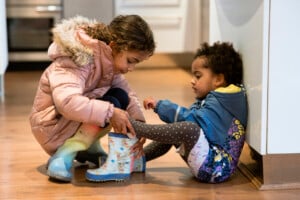“Did you eat that last piece of cake?” you ask, knowing full well the answer. But you give your sweet child a chance to fess up. You know that children lie, but parents always hope their child will be the exception to the rule.
“Nope!” comes the false-innocent response from your child. He has chocolate smears around his mouth and is guiltily wiping crumbs from their shirt.
Ahh, lying! It’s such a challenging behavior that our children display. And it can evoke really strong responses from parents. There is a lot of pressure on caregivers to respond in gentle and appropriate ways to stop the white lies, fibs, and outright whoppers that our children sometimes tell us. But mild responses aren’t our instinct all the time.
So, what is lying all about, and how can you respond?
You need to understand that not all lies are terrible or deviant. Learning to lie is a normal developmental milestone, and it’s actually an adaptive social skill. Lying requires your child to be able to understand things from another’s perspective of point of view. This is called “theory of mind,” and this also underpins the types of thinking our children require to be empathic (being able to step into someone else’s “shoes” and understand how they feel).
Children who can lie have developed the skill to understand things from another person’s point of view, lying also requires forward-thinking (an ability to plan) and also to increase favorable outcomes, or avoid unwanted reactions from others. Essentially what I’m trying to tell you is that lying is normal, but lying itself or the potential consequences are not always things we want to promote or encourage in our children.
Three Key Reasons Children Lie
These are not all of the reasons that children lie, of course, but many “sub” reasons for lying fall under these key discussions.
Boundary Testing
Our children need to test boundaries to feel safe. Boundary testing can feel incredibly frustrating and challenging, but it’s actually essential for their development and sense of safety! Children don’t always like boundaries, but they certainly need them. When we offer a firm and consistent boundary, our children know what to expect, and they can better predict the world around them. This equates to feeling safe because they know what the rules are and what is expected of them.
Lying falls into this category. Sometimes our kids lie to see just how far they can push us, and what they can get away with. Children are also very talented at being able to compartmentalize and figure out how boundaries differ between different people or within groups. So when our children lie, we need to have some pretty open conversations as a family about how we can consistently address and support our children when they are lying. This way, the outcome or expectation is always the same.
Care, Empathy, and Ego Protection
Our children are naturally empathic, and they will sometimes lie to protect a friend, loved one, or even their own ego. I’m sure all of us are guilty of this. Perhaps you’ve gushed over a friend’s new haircut when in reality, we think their permed poodle look is so 1980s. But we lie to protect their feelings. Our children are also capable of using lies as protective mechanisms, not only to stop their friends from being hurt but also to safeguard their social standing.
Normal stages of child development include figuring out where they stand in the social hierarchy (peers and family/community). Our children start to build social networks and put others first. They are less egocentric, and this helps establish mutually beneficial relationships that keep us mentally safe, due to the positive impacts of relationships on wellbeing and sense of connectedness. Children can also lie to protect not only the ego of their friends but also their own ego. Many kids will tell fibs to increase others’ perceptions of them. These are often tall tales, extensions of the truth to make themselves look more impressive, or they could be complete fabrications of their imaginations.
Avoid Punishment
This one is the most troublesome reason for lying. We can understand the rationale. No one wants to get in trouble, but if we let our children get away with this kind of lie it can have severe consequences throughout their lives. If this kind of lie isn’t picked up on, children learn that lying to avoid problems is okay, and they only get better at it. We need our children to be able to take ownership of mistakes and work to address the outcomes of those mistakes.
If a child is rewarded for their lying (i.e., that their lies mean they avoid punishment), it can certainly become problematic and strengthen their desire to lie. If a child does not learn how to accept or understand the impact of their behavior (consequences) on others, it can negatively impact relationships. It can also negatively impact general empathy and the capacity to consider the needs of others.
So how can we address lying with our kids?
1. Identify their “tells” and notice when they are lying. There might be long lags between you asking a question and their answer (while they figure out a story to tell you), talking faster than usual (to distract you and fill in silence), or their nonverbal clues might give them away (lack of eye contact, moving away from you to avoid close contact so you might be less likely to pick up on their lie).
2. “Aha! I know you ate that piece of cake!” It’s tempting to catch your child in a lie, but this can cause other issues like feelings of shame or reduced self-esteem.
3. Try to figure out what is the reason that underpins the lie. Why did they lie to begin with? You can then address the underlying behavior because punishing the lie itself won’t solve anything. We need to get to the root cause. If they lied to protect someone’s feelings, you can talk about other ways they can respond. Or if they did it to avoid getting in trouble, you can have a gentle discussion around what they could do differently next time (as a learning opportunity), etc.
4. Have lots of conversations (not just when you catch them telling a lie) about honesty. What is honesty? Why is it important?
5. Help them define fantasy versus reality. Don’t take all the fun out of their imaginative play. But when you read stories or watch TV shows, you can talk about them being from someone’s imagination, or that they are fantasy. “We can’t really fly, because our bodies are built to keep us in the air, but imagine what it might be like?”
6. Ask curious questions to keep judgment at bay. “I wonder if you were worried you might get in trouble for eating that cake?” And see how they respond. You don’t need to name the lie as a lie, but highlight the reality or get curious about what was underpinning the lie itself.
7. Avoid lecturing and highlight your curiosity rather than anger/distress, etc. “That doesn’t quite sound right, can you help me to understand what happened?”
Lying can be adaptive and social, but it can also be complex and has the potential for adverse outcomes. It’s important that we set clear expectations for the future and help our children to communicate their needs without having to resort to telling lies. If we provide our kids with problem-solving skills, conflict resolution skills, and positive communication skills, we minimize the likelihood of lies.































